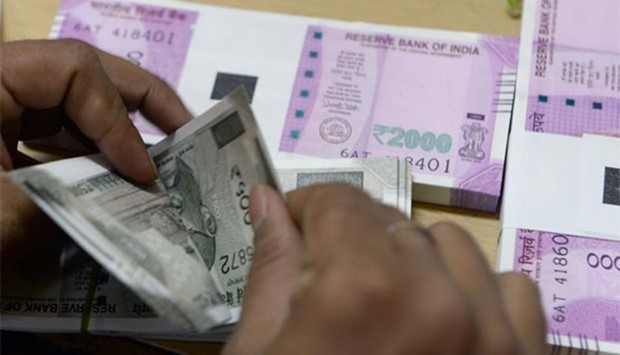India's economy grew by a slower-than-expected 7.3% in the second quarter, the government said on Wednesday, making an interest rate cut next week more likely amid warnings that a shortage of cash will dent growth.
Gross domestic product expanded 7.3% year-on-year in the three months to the end of September, up slightly from the previous quarter, official figures showed.
Analysts said the figures fell slightly short of expectations of around 8% for the second quarter of the financial year and would add to the pressure on the central bank to lower interest rates at a review next week.
That decision is also expected to be influenced by warnings of a spending slowdown after most of the country's currency was withdrawn from circulation earlier this month.
India remains the world's fastest-growing major economy, with growth outpacing Asian rival China for more than a year.
But economists say the government's shock move to pull 86% of the country's currency from circulation to tackle widespread tax evasion will hit the economy.
"The numbers for Q2 at 7.3% are marginally better than the previous quarter," said Subramaniam Sharma, analyst with the Greenback forex advisory service in Mumbai.
"But the effects of demonetisation will be witnessed in the next two quarters, especially between January and March."
Sharma predicted the Reserve Bank of India would cut rates, which are already at a six-year low of 6.25%.
"We can expect a rate cut from RBI in December and if the government can come up with a strong budget in January, it can offset the negative impact of demonetisation and help the GDP recover in the long run," Sharma said.
India runs largely on cash, but that is still in short supply, more than three weeks after Prime Minister Narendra Modi's announcement that 500 and 1,000 rupee notes would no longer be legal tender.
Experts say the move was a contributing factor to the rupee hitting an all-time low of 68.8625 rupees against the dollar last Thursday, although the main reason was an expected US rate rise next month.
Ratings agency Fitch has already lowered its India growth forecast for the current fiscal year from 7.4% to 6.9%, saying the cash crunch will bring "temporary disruptions" to economic activity.
India's chief statistician T C A Anant, however, said it was too early to tell what the impact would be.
"Demonetisation is even more complicated, because at this stage there is virtually no data," he told reporters in Delhi.
"So what will be the impact, as a a statistician I am unable to say anything now."
India's rosy GDP figures have drawn questions since the government in January 2015 revised its base year to 2011-12 and introduced new methods of calculating expansion which it said were closer to international standards.

The effects of India's demonetisation will be seen in the next two quarters, says an analyst.
